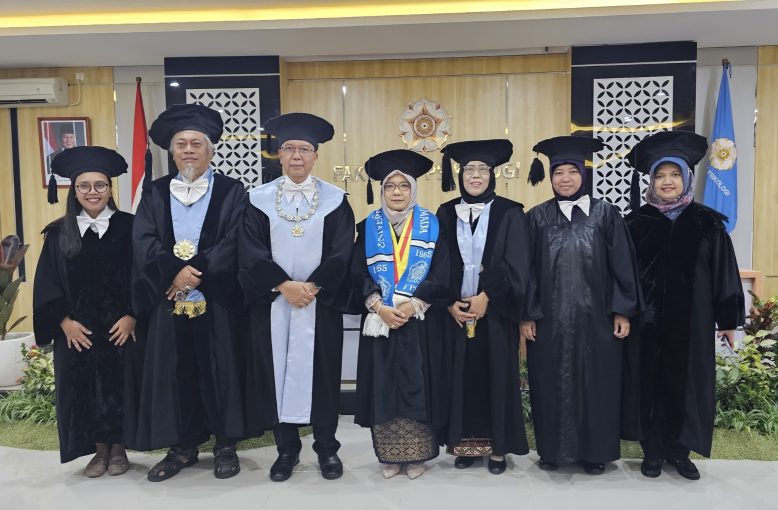
Haiyun Nisa, S.Psi., M.Psi., Psychologist, successfully earned her doctoral degree at the public defense of the Doctoral Program in Psychology, Universitas Gadjah Mada (UGM), on Thursday (June 26). Her dissertation, titled “The Inner Voice of Plaintiffs: Therapeutic Jurisprudence and Psychological Empowerment in Women Initiating Divorce,” led Haiyun to become the 6,517th doctoral graduate from UGM.
The doctoral defense was held in Room A-203 at the Faculty of Psychology UGM, chaired by the Dean of the Faculty, Rahmat Hidayat, S.Psi., M.Sc., Ph.D., and attended by leading academic examiners. Serving as the main advisor (Promoter) was Prof. Drs. Koentjoro, MBSc., Ph.D., Psikolog, with Pradytia Putri Pertiwi, S.Psi., Ph.D., as Co-Promoter. Other examiners included Prof. Dr. Tina Afiatin, M.Si., Psikolog; Diana Setiyawati, S.Psi., MHSc., Ph.D., Psikolog; and external examiner Prof. Dr. Nurul Hartini, S.Psi., M.Kes., Psikolog from Universitas Airlangga’s Faculty of Psychology.
Haiyun’s research focused on the inner experiences of women who file for divorce due to household conflicts, their efforts to endure the situation, and the emotional toll that is often difficult to express to others. She emphasized that the divorce process is not only legally exhausting but also psychologically draining—especially since most divorce cases in Indonesia are initiated by women.
To explore this issue, Haiyun involved women who were currently or had previously filed for divorce. Her research was conducted in four phases: exploring their experiences, designing an intervention plan, implementing a support program, and drafting policy recommendations. The results revealed that legal proceedings often cause significant psychological stress. From this, she developed a support module titled “Perempuan Tangguh” (“Resilient Women”) to help women build mental strength during the divorce process.
This study is considered groundbreaking for integrating legal and psychological approaches—fields rarely studied together. Beyond helping women better prepare for legal proceedings, her findings advocate for the importance of psychological services within the courtroom. Haiyun hopes that, in the future, Indonesia’s legal system will be more attentive to the human and mental health aspects of litigants, especially women.
“This research is not meant to normalize divorce, but rather to open space for a more empathetic and restorative legal system. I hope this approach can encourage a paradigm shift in courtroom practices, making them more responsive to the psychological aspects of those involved, particularly women,” Haiyun stated in her speech after officially earning her doctorate. She completed her studies in 3 years, 9 months, and 19 days, graduating with a GPA of 3.92 (cum laude).
Writer: Relung Fajar Sukmawati
